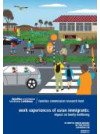This research study explores the work experiences of immigrants of Asian origin living in the greater Auckland region, New Zealand.
Family interviews with people in a range of work situations were conducted with a total of 78 Chinese, Korean, Southeast Asian, South Asian and ‘Asian with refugee background’ participants, which included 20 families comprising 43 adults and 35 children of various ages.
Key findings included a number of barriers to appropriate employment, positive work experiences and family wellbeing. Most of the families interviewed found that their work experiences impacted negatively on family wellbeing, often resulting in a poor work-life balance, stress, poor mental health and intergenerational conflict. All families faced similar challenges, to varying degrees.
Purpose
The aim of the research is to explore the work experiences – including barriers and facilitators to accessing appropriate employment – of Asian immigrants living in New Zealand, and the impact of these on family wellbeing. The cultural assumptions about work and family and the impact of these assumptions on family wellbeing were also of interest.
Specifically, the study sought to address the following key research questions:
- What are the patterns and experiences of work (both flexible and inflexible) amongst Asian immigrants living in New Zealand?
- What are cultural assumptions about the nature of work, and how are the concepts of family and work understood by these communities?
- What impacts do these cultural assumptions and concepts, and work patterns and experiences have on family wellbeing, including the positive and adverse impacts (eg, having time to do things as a family; blurring the boundary between work and family)?
Key Results
An analysis of family interviews identified a number of barriers to appropriate employment, positive work experiences and family wellbeing. These included negative attitudes such as: racism and discrimination; non-recognition of qualifications; lack of appropriate information and assistance; systemic and resource inadequacies; lack of social support; language and education deficiencies; cultural differences; and dysfunctional coping strategies. Facilitators included positive attitudes towards Asian immigrants; equal employment opportunities; institutional and social support; English language proficiency; and resiliency and functional coping strategies. Most of the families interviewed found that their work experiences impactednegatively on family wellbeing, often resulting in a poor work-life balance, stress, poor mental health and intergenerational conflict. All families faced similar challenges, to varying degrees.

